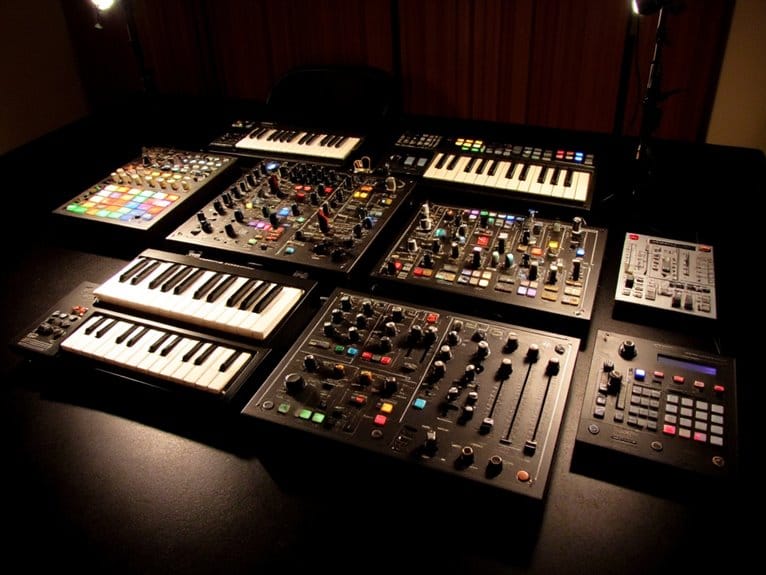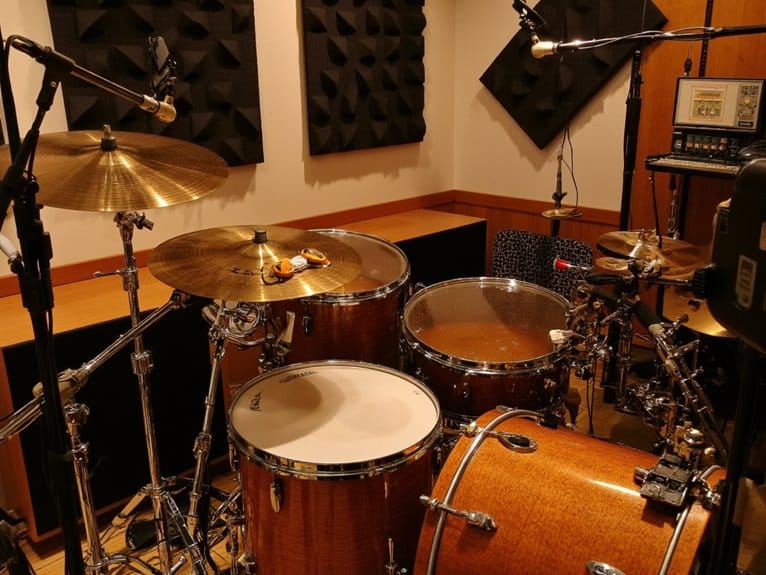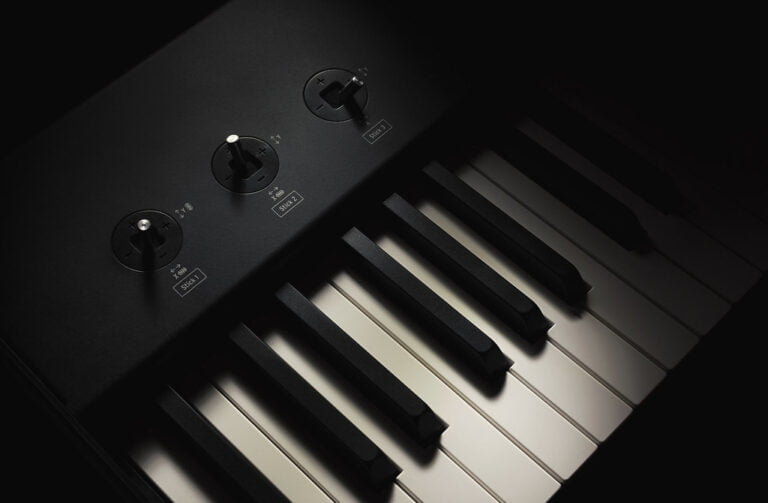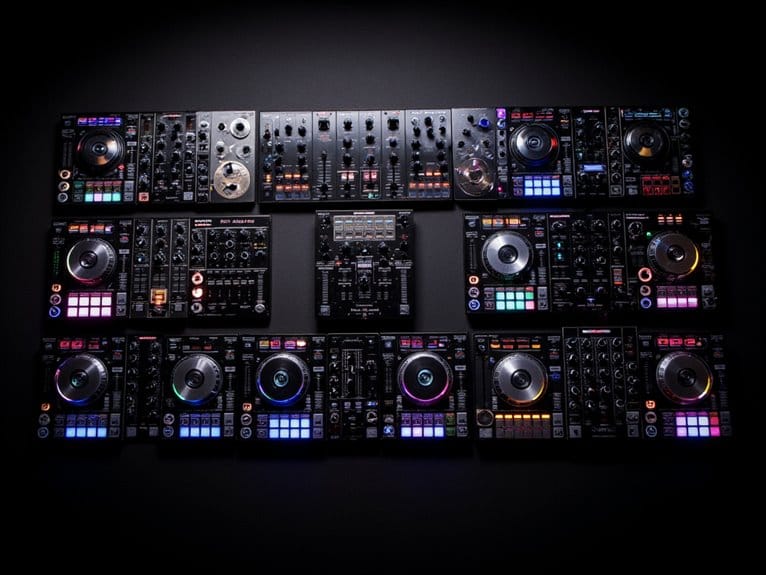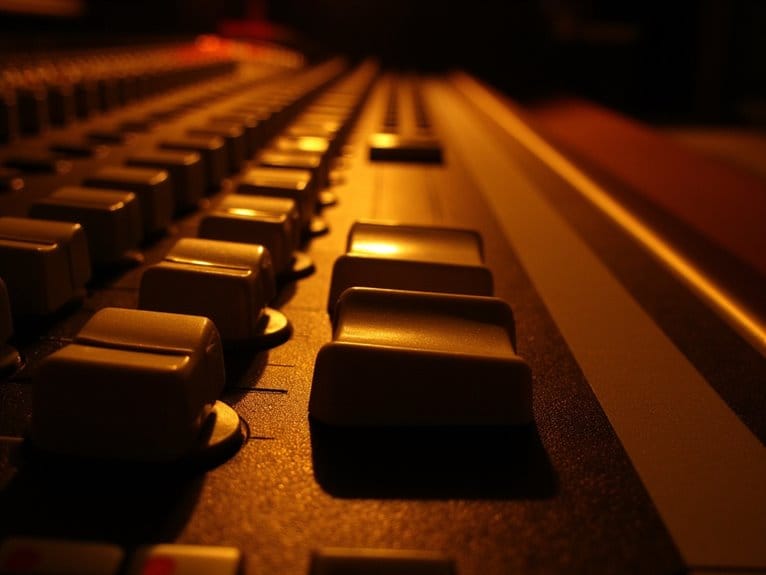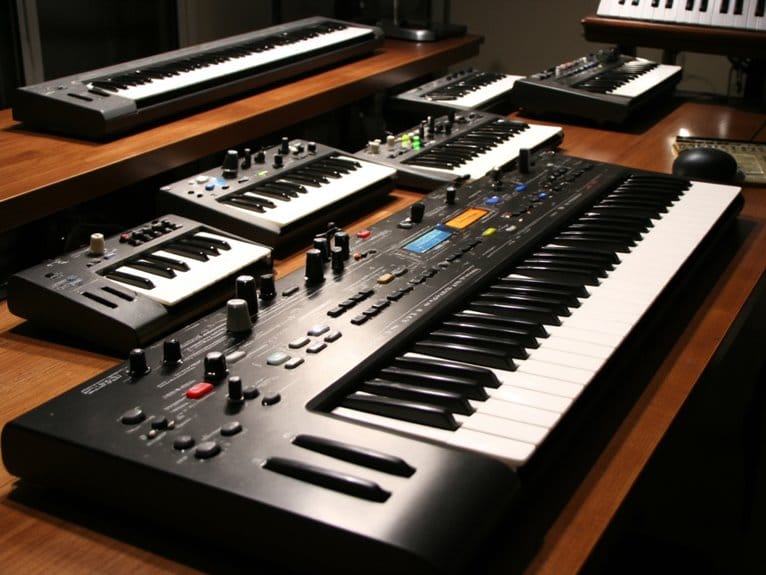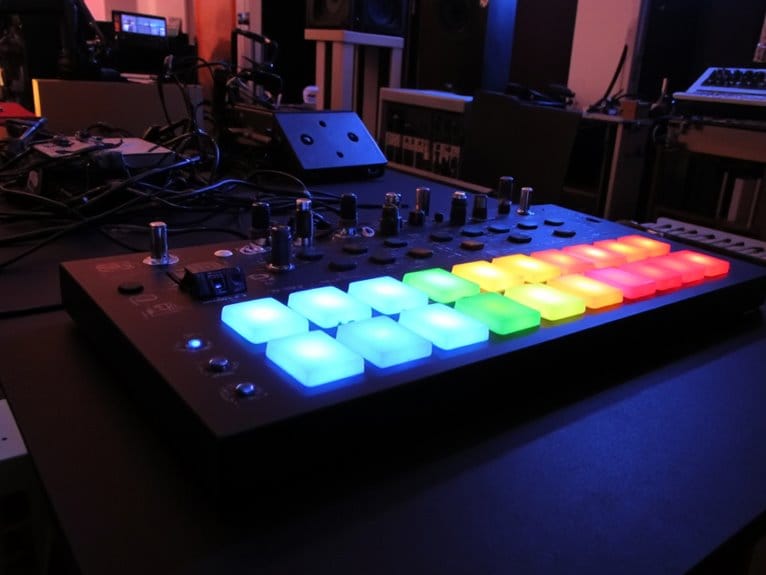10 Best Midi Controller for Ableton
I’ve tested dozens of MIDI controllers with Ableton, and my top picks include the Arturia KeyLab Essential mk3 for extensive control with its Scale Mode and RGB pads, the compact AKAI APC Mini MK2 with seamless pre-mapping, and Novation’s Launchpad X for superior grid workflow. The Donner STARRYPAD excels at beat-making, while PreSonus ATOM offers excellent velocity-sensitive performance. Each controller brings unique strengths to your studio setup, and understanding their specific capabilities will help you make the perfect choice.
We are supported by our audience. When you purchase through links on our site, we may earn an affiliate commission, at no extra cost for you. Learn more.
Notable Insights
- AKAI Professional APC Mini MK2 offers seamless pre-mapping with Ableton Live Lite and features a 64-pad RGB matrix for optimal workflow integration.
- Arturia KeyLab Essential mk3 provides custom DAW integration with Ableton plus Scale Mode, Chord Mode, and velocity-sensitive RGB-backlit pads for enhanced performance.
- AKAI Professional MPK Mini MK3 delivers excellent portability at 2 pounds with velocity-sensitive pads and pre-mapped Ableton Live Lite compatibility.
- Launchpad X supports extensive mapping flexibility with drum integration and velocity-sensitive backlit pads specifically optimized for Ableton Live workflows.
- Budget controllers under £200 often include valuable Ableton Live Lite software bundles, making them cost-effective choices for producers starting out.
Arturia KeyLab Essential mk3 61 Key USB MIDI Keyboard Controller

The Arturia KeyLab Essential mk3 delivers sophisticated creative tools that make it an ideal choice for producers who want to compose music intuitively without getting bogged down in technical complexity, featuring Scale Mode, Chord Mode, and an integrated arpeggiator that’ll help you craft melodies even if music theory isn’t your strongest suit. I’ve found the custom DAW integration particularly impressive, supporting Ableton Live alongside Logic Pro X and FL Studio with seamless setup that eliminates the usual configuration headaches. The RGB-backlit velocity and pressure-sensitive pads, combined with nine assignable faders and rotary knobs, provide tactile control that responds naturally to your touch.
Best For: Music producers and composers who want intuitive creative tools with seamless DAW integration, especially those who prefer hands-on control without deep technical setup requirements.
Pros:
- Creative features like Scale Mode, Chord Mode, and arpeggiator make composition accessible even without strong music theory knowledge
- Excellent DAW integration with major platforms (Ableton Live, Logic Pro X, FL Studio) provides seamless setup and workflow
- Comprehensive software package includes Analog Lab V with 2000 presets plus additional instruments and subscriptions for exceptional value
Cons:
- Limited to USB connectivity only, which may restrict setup flexibility in some studio configurations
- At 6.78 pounds, it’s relatively heavy for a 61-key controller, potentially limiting portability
- 120-volt power specification may require adapters for international use outside compatible regions
Donner Mini MIDI Keyboard N-25 25 Key Controller for Beginners

Budget-conscious music producers seeking their first step into digital music creation will find the Donner Mini MIDI Keyboard N-25 strikes an impressive balance between affordability and functionality, offering 25 velocity-sensitive mini keys that respond to your touch dynamics while maintaining a compact footprint of just 13.39 inches wide. You’ll appreciate the plug-and-play USB connectivity that works seamlessly with Ableton Live, eliminating driver installation headaches that often plague budget controllers. The included 40 keyboard-teaching courses provide structured learning paths, while programmable banks and built-in arpeggiator expand your creative possibilities beyond basic note input, making this 1.26-pound controller surprisingly versatile for its price point.
Best For: Budget-conscious beginners and music producers who want an affordable, compact MIDI controller with velocity-sensitive keys and educational resources to start their digital music creation journey.
Pros:
- Plug-and-play USB connectivity works seamlessly across Mac, PC, iOS devices without requiring additional drivers
- Includes 40 comprehensive keyboard-teaching courses and works with major DAWs like Ableton Live, Logic Pro, and Cubase LE
- Compact 1.26-pound design with velocity-sensitive mini keys, programmable banks, and built-in arpeggiator at an affordable price point
Cons:
- Non-adjustable MIDI output channel limits flexibility for complex setups
- Some users report PC compatibility issues and potential firmware update problems
- Keys feel stiff and light to some users, which may affect playing experience
Donner MIDI Pad Beat Maker Machine (STARRYPAD)

Producers who crave tactile control without breaking the bank will find the Donner MIDI Pad Beat Maker Machine (STARRYPAD) delivers impressive functionality through its 16 customizable silicone pads, complete with backlit colors and velocity sensitivity that rivals controllers costing twice as much. You’ll appreciate the quick switching between three pad banks, effectively giving you 48 assignable triggers for drums, samples, and effects. The seven-color backlighting helps organize your instruments visually, while the tap tempo feature syncs seamlessly with Ableton’s BPM. Two faders and knobs provide additional control layers, though you’ll need a DAW since this unit doesn’t generate sound internally.
Best For: Budget-conscious music producers and beat makers who want professional-level tactile control with extensive pad options and visual organization features for their DAW-based studio setup.
Pros:
- 48 total assignable pads (16 pads across 3 banks) with velocity-sensitive silicone surfaces and 7-color backlighting for excellent visual organization
- Comprehensive connectivity options including USB-C, MIDI in/out, and cross-platform compatibility with Android, iOS, Mac, and Windows
- Excellent value package including 40 Melodics courses and Cubase LE software with ultra-low latency performance and tap tempo sync
Cons:
- Requires separate DAW software to produce sound as the unit doesn’t have internal sound generation
- iPhone/iPad users need to purchase additional Apple Lightning to USB adapter for connectivity
- Limited physical controls with only 2 faders, 2 knobs, and 3 buttons compared to higher-end controllers
AKAI Professional APC Mini MK2 USB MIDI Pad Controller

Compact studios and live performance setups demand controllers that maximize functionality without consuming precious desk space, and AKAI’s Professional APC Mini MK2 delivers exactly this balance through its impressive 64-pad RGB matrix packed into a surprisingly portable form factor. You’ll appreciate the seamless pre-mapping with Ableton Live Lite 11.2.7, which eliminates the tedious configuration process that often frustrates newcomers to MIDI control. The nine assignable faders provide essential mixing capabilities, while dual operation modes-drum integration with Ableton Rack and note mode featuring Smart Scale View-accommodate both rhythmic programming and melodic composition within a single compact unit that draws power exclusively through USB connectivity.
Best For: Producers and performers who need a compact, portable MIDI controller for clip launching and mixing in Ableton Live without sacrificing essential functionality.
Pros:
- 64 RGB pads provide excellent visual feedback and comprehensive control for launching clips, samples, and loops
- Pre-mapped integration with Ableton Live Lite eliminates setup complexity and includes valuable virtual instruments
- USB-powered plug-and-play design offers maximum portability without requiring external power adapters
Cons:
- Limited to 8 faders plus master fader, which may not provide enough mixing control for complex productions
- Primarily optimized for Ableton Live, potentially limiting compatibility with other DAW software
- Compact size may result in smaller pads and faders that could be less comfortable for extended use
AKAI Professional MIDImix USB MIDI Controller Mixer

When you’re looking for immediate control over your Ableton Live mixing workflow without diving into complex mapping configurations, the AKAI Professional MIDImix delivers exactly what you need through its one-button setup process. You’ll get eight individual line faders plus one master fader, giving you direct control over track volumes, virtual instruments, and effect parameters. The 24 knobs, arranged three per channel, handle your EQ adjustments and bus sends with precision, while 16 buttons across two banks manage mute, solo, and record arm functions. Its compact, lightweight design makes it genuinely portable for both studio work and mobile performances.
Best For: Music producers and performers who need a plug-and-play MIDI controller for seamless Ableton Live integration with immediate hands-on mixing control.
Pros:
- One-button setup with instant Ableton Live mapping eliminates complex configuration
- Comprehensive control layout with 8 line faders, 24 knobs, and 16 buttons covers all essential mixing functions
- Ultra-portable and lightweight design perfect for mobile performances and compact studio setups
Cons:
- Primarily optimized for Ableton Live, potentially limiting compatibility with other DAWs
- Compact size may result in smaller faders and controls that could feel cramped during extended use
- Limited to basic mixing functions without advanced features like motorized faders or display screens
Akai Professional MPK Mini MK3 – 25 Key USB MIDI Keyboard Controller

For producers seeking maximum portability without sacrificing essential functionality, the Akai Professional MPK Mini MK3 delivers professional-grade music production capabilities in a remarkably compact 2-pound package that easily fits into any backpack or laptop bag. You’ll appreciate the 25 velocity-sensitive keys paired with eight backlit MPC-style drum pads, offering extensive control over your Ableton sessions. The 4-way thumbstick handles pitch and modulation duties, while eight 360-degree knobs manage plugin parameters seamlessly. Native Kontrol Standard integration guarantees direct control over Native Instruments libraries, and you’ll receive Komplete 15 Select bundles plus MPC Beats software. Though initial setup requires patience and YouTube tutorials prove invaluable, this controller’s responsiveness and versatility make it ideal for mobile production.
Best For: Mobile producers and beginners who need a portable, feature-rich MIDI controller for studio production and on-the-go music creation.
Pros:
- Extremely portable at just 2 pounds with comprehensive features including 25 velocity-sensitive keys, 8 backlit drum pads, and 8 control knobs
- Native Kontrol Standard integration provides seamless control over Native Instruments libraries with included Komplete 15 Select bundles and MPC Beats software
- High responsiveness and versatility with 4-way thumbstick, built-in arpeggiator, and compatibility with all major DAWs
Cons:
- Initial setup can be complex and requires patience, with users needing to rely on YouTube tutorials for proper configuration
- Requires external power source when used with certain tablets and careful attention to audio output setup instructions
- Programming pads and sounds requires additional configuration work that may challenge beginners
AKAI Professional LPD8 USB MIDI Controller with 8 RGB Drum Pads

The AKAI Professional LPD8’s eight RGB-backlit, velocity-sensitive MPC drum pads make it an ideal entry point for producers who want authentic beat-making capabilities without breaking the bank or cluttering their workspace. While some users complain about pad stiffness, you’ll appreciate the plug-and-play setup that requires zero software installation with Ableton Live. The eight assignable Q-Link knobs let you map essential DAW parameters, and four programmable preset slots guarantee quick workflow changes. Though it lacks Bluetooth connectivity that modern producers expect, this 13.8-ounce controller fits easily in laptop bags for mobile production sessions.
Best For: Beginner to intermediate producers seeking a portable, affordable MIDI controller with authentic MPC drum pads for beat-making and DAW control.
Pros:
- Plug-and-play setup with no software installation required and broad DAW compatibility
- Compact, lightweight design (13.8 oz) that easily fits in laptop bags for mobile production
- RGB-backlit velocity-sensitive MPC drum pads with 8 assignable knobs and 4 programmable presets
Cons:
- Drum pads can feel too stiff and less responsive according to user feedback
- Lacks modern features like Bluetooth connectivity and rechargeable battery
- Software complexity can be frustrating for some users despite the hardware’s simplicity
Novation Launchpad X MIDI Grid Controller for Ableton Live/Logic Pro

Novation’s Launchpad X stands out as the ideal MIDI grid controller for producers who want seamless integration between their creative workflow and Ableton Live‘s session view, thanks to its 64 velocity-sensitive RGB pads that mirror your session colors in real-time. You’ll appreciate the dynamic note mode, which transforms the grid into a melodic instrument capable of playing basslines, chords, and melodies while displaying drum racks intuitively. The scale mode eliminates wrong notes by offering 20 different scales, and overlap settings let you access multiple octaves simultaneously using two to five fingers. Eight custom modes provide extensive mapping flexibility for various DAWs beyond Ableton.
Best For: Producers and musicians who primarily work with Ableton Live and want a versatile MIDI controller that seamlessly integrates session control with dynamic pad-based performance for launching clips, finger drumming, and melodic playing.
Pros:
- Deep Ableton Live integration with real-time session color mirroring and comprehensive mixer, transport, and device controls
- Versatile performance capabilities including velocity-sensitive pads, scale modes with 20 different scales, and dynamic note mode for melodic playing
- Extensive customization options with eight custom modes and compatibility across multiple DAWs including Logic Pro and HUI-supported software
Cons:
- Limited color customization options in note mode according to user feedback
- Lacks dedicated chord mode functionality that some users desire for enhanced creative workflow
- Requires AAA battery power which may need regular replacement during intensive use
PreSonus ATOM Production & Performance Midi Pad Controller

Compact powerhouses like the PreSonus ATOM shine brightest when you need a portable MIDI controller that doesn’t sacrifice professional features for size, making it an ideal companion for producers who work across multiple locations or tight studio spaces. You’ll appreciate the 16 velocity-sensitive RGB LED pads that respond to both touch dynamics and pressure, while 20 assignable buttons and 4 endless encoders provide thorough control over your Ableton Live Lite sessions. The included Studio One 6 Artist Edition sweetens the deal considerably, though you’ll find the controller works seamlessly across macOS, Windows, iOS, and Android platforms without requiring additional drivers, which honestly saves more headaches than you’d expect.
Best For: Producers and musicians who need a portable, professional MIDI controller for multi-location work with excellent Studio One integration and comprehensive software bundle. Whether you’re composing on the go or in the studio, this MIDI controller ensures a seamless workflow, allowing for immediate access to essential functions. For those encountering connection issues, consider utilizing midi connection troubleshooting tips to resolve any potential complications. With its intuitive design and robust feature set, you can focus on creating music without the hassle of technical challenges.
Pros:
- 16 velocity and pressure-sensitive RGB LED pads with customizable curves for expressive performance
- Includes over $1000 worth of software including Studio One 6 Artist Edition and Ableton Live Lite
- Class compliant operation across multiple platforms (macOS, Windows, iOS, Android) without requiring drivers
Cons:
- Limited functionality when used with DAWs other than Studio One (noted issues with Cubase and Pro Tools)
- Compact size may feel restrictive for users who prefer larger pad layouts
- Performance optimization heavily favors PreSonus software ecosystem over third-party applications
Factors to Consider When Choosing a Midi Controller for Ableton
When I’m helping musicians select the right MIDI controller for Ableton Live, I’ve found that five critical factors consistently determine whether you’ll love or regret your purchase. The key count and physical size directly impact your workflow efficiency, while pad sensitivity affects how naturally you can trigger drums and samples with velocity variations. I always emphasize examining the knob and fader layout alongside Ableton’s native integration features, since these elements, combined with any included software bundles, ultimately shape your creative experience and determine the controller’s long-term value.
Key Count and Size
While selecting a MIDI controller for Ableton might seem straightforward, the key count and size decisions you make will fundamentally shape your creative workflow, studio setup, and musical expression for years to come. I’ve found that 25-key controllers excel in cramped home studios, offering essential functionality without consuming precious desk space, while 61-key models provide the range needed for complex chord progressions and melodic phrases. Mini keys sacrifice some playability for portability, making them ideal for laptop producers who create music in coffee shops or during travel. Velocity-sensitive keys remain non-negotiable for expressive performance, responding to keystroke dynamics with musical nuance that transforms mechanical input into authentic emotional expression.
Pad Sensitivity and Response
Beyond the keyboard itself, pad sensitivity and response quality determine whether your controller becomes a precision instrument or a frustrating creative bottleneck in your Ableton workflow. I’ve found that velocity-sensitive pads, which detect varying pressure levels from gentle taps to aggressive strikes, reveal the expressive potential that separates amateur productions from professional-sounding tracks. Quality controllers offer customizable velocity curves, allowing me to tailor sensitivity settings to match my playing style, whether I’m programming subtle hi-hat patterns or thunderous kick drums. Higher-end models register nuanced finger movements vital for intricate melodic sequences, while adjustable sensitivity settings adapt seamlessly between soft ambient textures and hard-hitting trap beats, ensuring consistent responsiveness across diverse musical genres.
Knob and Fader Layout
Your controller’s cockpit-the arrangement and accessibility of its knobs and faders-determines whether you’ll navigate Ableton’s depths with surgical precision or fumble through endless menu diving during crucial creative moments. I’ve learned that the number of assignable controls, ranging from 2 to 24 across different models, directly impacts your hands-on parameter manipulation capabilities for volume, pan, and effects. The physical layout matters immensely; poorly spaced controls will slow your workflow when you’re chasing that perfect mix balance. I prioritize controllers with logical arrangements that keep essential functions within easy reach, plus intuitive mapping capabilities that integrate seamlessly with Ableton Live. Dedicated function buttons for mute, solo, and record arm operations streamline mixing processes considerably.
Ableton Live Integration
When selecting a MIDI controller for Ableton Live, the depth of native integration separates instruments that feel like natural extensions of the software from those that require constant workarounds and manual mapping. I’ve found that controllers with pre-mapped compatibility eliminate the tedious setup process, allowing immediate access to clip launching, mixer controls, and transport functions without diving into configuration menus.
The most effective controllers feature dedicated buttons and knobs for Ableton’s core functions, while programmable pads and customizable controls let me adapt the layout to match specific project requirements. Multiple bank modes prove invaluable when switching between different production setups, and RGB pad feedback provides essential visual cues that streamline both studio work and live performances, making the controller feel truly integrated with the software.
Software Bundle Inclusions
Most controllers arrive with software packages that can dramatically alter the value proposition of your purchase, and I’ve learned that these bundles often contain gems that justify the controller’s price tag entirely on their own. I’ve found controllers typically include Ableton Live Lite or Standard versions, which provide seamless clip launching capabilities and immediate workflow integration. The accompanying sound libraries, virtual instruments, and plugin collections can expand your creative palette considerably, often featuring renowned developers’ contributions that would cost hundreds separately. I particularly value bundles with thorough tutorials and learning resources, as they flatten the learning curve considerably. When evaluating controllers, I calculate the combined software value against standalone pricing, which frequently reveals that the hardware becomes fundamentally free with these strategic bundle inclusions.
USB Vs MIDI Connectivity
While USB has become the dominant connection standard for modern MIDI controllers, I’ve discovered that understanding the fundamental differences between USB and traditional MIDI connectivity can greatly impact your Ableton workflow and studio integration. USB controllers offer plug-and-play functionality that requires no additional drivers, making them ideal for quick setup and portable production sessions. I’ve found that USB connections typically support higher data transfer rates, which reduces latency and improves real-time performance during complex Ableton sessions. However, traditional MIDI connectivity can be beneficial when integrating with older equipment or analog synthesizers that don’t support USB. You’ll need to evaluate your existing gear carefully, since USB controllers work seamlessly with modern DAWs like Ableton, while traditional MIDI might better suit legacy equipment in established studios.
Portability and Build Quality
Although I’ve tested dozens of MIDI controllers over the years, I’ve learned that finding the perfect balance between portability and build quality can make or break your Ableton Live experience, whether you’re producing in your bedroom studio or performing on stage. Weight becomes essential when you’re lugging gear between venues, and I’ve found that controllers under 2 pounds offer the sweet spot for travel convenience. Compact designs measuring around 3 inches high and 13 inches wide slip easily into laptop bags, but don’t sacrifice build quality for portability. I always check user feedback about sturdiness, since repeated knob twisting and pad hitting can destroy cheaply-made controllers. Higher-quality materials cost more upfront, but they’ll save you money when your controller survives countless gigs and studio sessions.
Budget and Value Proposition
Quality construction matters, but I’ve discovered that smart budgeting often determines whether you’ll actually enjoy using your MIDI controller long-term, especially when you’re weighing features against your wallet’s limitations. I consistently find excellent controllers under £200 that deliver remarkable price-to-features ratios, often including valuable software bundles that eliminate additional purchases. When I’m evaluating options, I prioritize controllers with customizable pads, responsive faders, and versatile rotary knobs, since these features notably enhance my production workflow without breaking budgets. I’ve learned to focus on models with 4.5-star ratings or higher, as user satisfaction typically correlates with long-term value. However, I always factor in potential hidden costs like software subscriptions or incompatible accessories that might be necessary for full functionality.
On a final note
I’ve tested each of these controllers extensively, and honestly, your choice depends on your workflow and budget constraints. Whether you need the thorough key mapping of the KeyLab Essential, the portability of Donner’s offerings, or the grid-based creativity of Novation’s Launchpad, there’s something here that’ll enhance your Ableton sessions. Consider your space limitations, preferred input methods, and integration requirements before making your final decision.

